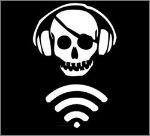 In most jurisdictions it’s standard practice for those who commit online copyright infringement to be held responsible for their own actions. In Germany, however, the situation is more complex.
In most jurisdictions it’s standard practice for those who commit online copyright infringement to be held responsible for their own actions. In Germany, however, the situation is more complex.
Due to a legal concept known as ‘Störerhaftung’ (‘interferer liability’), a third party who played no intentional part in someone else’s infringements can be held responsible for them. This type of liability has raised its head in a number of file-sharing cases where WiFi owners have been considered liable for other people’s piracy.
As a direct result of this precarious legal position, Germany has found itself trailing behind its European neighbors when it comes to providing public Internet hotspots. Some have described the situation as an embarrassment for one of the most advanced countries in the world.
Under pressure and in response to a European Court of Justice opinion on the matter last March, the government eventually decided to rescind liability for open WiFi operators. In September, a full decision from the EU Court of Justice further underlined the position.
Since then the government has been working on changes to local law to bring it into line with EU standards. This Wednesday a third draft presented by Brigitte Zypries, Minister for Economics and Energy, was adopted by the cabinet.
Should the amendments receive parliamentary approval, businesses will be free to offer open WiFi to their customers, without fear of being held liable for their actions. They will also be able to offer truly open WiFi, with no requirement to verify the identities of users or have them log in with a password.
While copyright holders won’t be pleased by the changes, they will still have opportunities to clamp down on infringement. If a certain WiFi location is connected with online piracy, a properly filed complaint will require the operator to bar access to websites connected with the infringement.
How this will work in respect of P2P transfers like BitTorrent will remain to be seen but WiFi operators are likely to be more relaxed blocking domains in their routers than appearing in court charged with copyright infringement.





